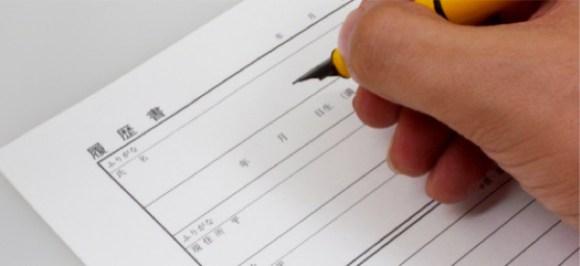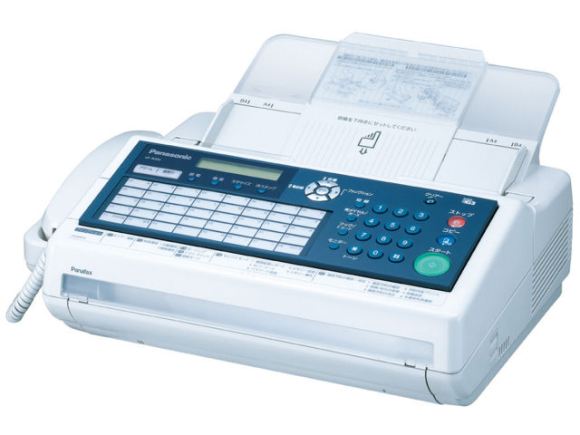
Traditionally, Japanese resumes are handwritten on a special form. Recently, however, typed resumes are becoming more common – and one recruiter is not happy about this. Writing anonymously on Japanese website Hatelabo, the blogger, who works for a chain restaurant in Japan and is involved in recruitment, sets out his reasons for why an applicant who submits a typewritten resume should be the first to find their application on the “no” pile.
“You young people, don’t you have any common sense?” he asks of applicants with the typed resumes. “Are you crazy? In my day, this would have been unimaginable!” Let’s take a look at the pros and cons of the handwritten CV.
The recruiter’s blogpost is addressed at young graduating Japanese students (shūkatsusei). Obviously, if you’re applying for a job in the English-teaching sector, a resume in English will do you just fine, and no one’s going to ask you to hand-write it for them. But in most other situations, a handwritten resume is still considered to be superior by many. But why?
Being able to write Japanese neatly is – traditionally anyway – considered a valuable skill. The writing system’s complexity means a relatively large proportion of the school timetable is devoted to learning to read and write kanji. A handwritten resume allows the recruiter to make a judgement (valid or invalid) about the education and character of the person who wrote it. It also gives the recruiter who is sifting through an enormous pile of papers an extra way to get rid of a number of them straight away.
▼ Or you could do what this person did and hire based on folder colour.
A handwritten resume is also supposed to illustrate just how much you want the job. Filling out the same form by hand over and over again – in pen, without using correction tape, and starting from scratch if you make a mistake – is extremely time-consuming. That’s supposed to indicate your level of commitment to the application. As our anonymous Hatelabo blogger writes:
“Which would you hire: the student who took the time to write out an individual hand-written CV, or the one who just bashed away at the keyboard for a few seconds?”
Lastly, Japanese people are supposed to write a resume out by hand because that’s just the way it’s done. Japan may have something of a reputation as a futuristic robot wonderland, but when it comes to documentation, paper is somehow considered more trustworthy than digital data.
▼I had literally never even SEEN a fax machine before I moved to Japan.
Our blogging recruiter sees handwriting your application as a fundamental piece of common sense:
“It’s not just that you won’t get the job if you don’t handwrite your resume. It’s that the person who doesn’t understand the value of writing a resume by hand is no use to us.”
The Hatelabo post has attracted attention online – it’s been tweeted over 3,000 times already – as much for its angry tone and eccentric phrasing as for its content. Commenters were weirded out by the writer’s use of language (referring to typed resumes as being made using a wāpuro – word processor – for example), with some even suggesting that the whole thing was a hoax, or had been written by a disgruntled jobseeker.
But most commenters found the whole thing ridiculous:
“I don’t understand why you’d want to hire someone who can’t use a computer.”
“I’d never hire someone who wasted their time doing such a stupidly inefficient thing as handwriting the same thing out over and over.”
“What? People who handwrite resumes nowadays are idiots, aren’t they? Well, he did say he worked at a chain restaurant…”
As the proliferation of computers and smartphones makes handwriting a dying art for many Japanese adults, it seems this is a debate that will run and run.
Source: oreteki gēmu sokuhou, Hatelabo
Featured image: careerpark



 Japanese job-hunters reportedly dismayed by requests for “photos showing who you are as a person”
Japanese job-hunters reportedly dismayed by requests for “photos showing who you are as a person” No gender, photo, or first name – Japanese company makes major shakeup to job application forms
No gender, photo, or first name – Japanese company makes major shakeup to job application forms Japanese company is so kind it mails out condolence gifts if it can’t give applicants a job
Japanese company is so kind it mails out condolence gifts if it can’t give applicants a job Japan has a new bar just for people thinking about quitting their jobs, and the drinks are free
Japan has a new bar just for people thinking about quitting their jobs, and the drinks are free Four factors frustrating foreigners fighting for jobs in Japan
Four factors frustrating foreigners fighting for jobs in Japan Japan’s craziest burger chain takes menchi katsu to new extreme levels
Japan’s craziest burger chain takes menchi katsu to new extreme levels Starbucks Japan releases first-ever Hinamatsuri Girls’ Day Frappuccino
Starbucks Japan releases first-ever Hinamatsuri Girls’ Day Frappuccino Potama serves up epic rice balls like no other, and there’s only one store in Tokyo
Potama serves up epic rice balls like no other, and there’s only one store in Tokyo Family Mart ups its convenience store food game with special burger from beef bowl chain Matsuya
Family Mart ups its convenience store food game with special burger from beef bowl chain Matsuya Eevee returns to Japan’s famous Tokyo Banana, bundled with a cute tote bag
Eevee returns to Japan’s famous Tokyo Banana, bundled with a cute tote bag Japanese restaurant chain serves Dragon Ball donuts and Senzu Beans this spring
Japanese restaurant chain serves Dragon Ball donuts and Senzu Beans this spring Which convenience store onigiri rice balls are the most popular? Survey reveals surprising results
Which convenience store onigiri rice balls are the most popular? Survey reveals surprising results Foreign tourists spending at Japanese department stores dropping rapidly, study says
Foreign tourists spending at Japanese department stores dropping rapidly, study says Create your own Sailor Moon heroines with the awesome Sailor Senshi Maker
Create your own Sailor Moon heroines with the awesome Sailor Senshi Maker Drift ice in Japan is a disappearing winter miracle you need to see now
Drift ice in Japan is a disappearing winter miracle you need to see now Highest Starbucks in Japan set to open this spring in the Tokyo sky
Highest Starbucks in Japan set to open this spring in the Tokyo sky Tokyo Skytree turns pink for the cherry blossom season
Tokyo Skytree turns pink for the cherry blossom season Yakuzen ramen restaurant in Tokyo is very different to a yakuza ramen restaurant
Yakuzen ramen restaurant in Tokyo is very different to a yakuza ramen restaurant Japan Extreme Budget Travel! A trip from Tokyo to Izumo for just 30,000 yen [Part 1]
Japan Extreme Budget Travel! A trip from Tokyo to Izumo for just 30,000 yen [Part 1] Japan has only one airport named after a samurai, so let’s check out Kochi Ryoma【Photos】
Japan has only one airport named after a samurai, so let’s check out Kochi Ryoma【Photos】 Japanese drugstore sells onigiri at pre-stupid era prices, but how do they compare to 7-Eleven?
Japanese drugstore sells onigiri at pre-stupid era prices, but how do they compare to 7-Eleven? Burning through cash just to throw things away tops list of headaches when moving house in Japan
Burning through cash just to throw things away tops list of headaches when moving house in Japan Starbucks Japan releases new sakura goods and drinkware for cherry blossom season 2026
Starbucks Japan releases new sakura goods and drinkware for cherry blossom season 2026 Japan’s newest Shinkansen has no seats…or passengers [Video]
Japan’s newest Shinkansen has no seats…or passengers [Video] Foreigners accounting for over 80 percent of off-course skiers needing rescue in Japan’s Hokkaido
Foreigners accounting for over 80 percent of off-course skiers needing rescue in Japan’s Hokkaido Super-salty pizza sends six kids to the hospital in Japan, linguistics blamed
Super-salty pizza sends six kids to the hospital in Japan, linguistics blamed Starbucks Japan unveils new sakura Frappuccino for cherry blossom season 2026
Starbucks Japan unveils new sakura Frappuccino for cherry blossom season 2026 Foreign tourists in Japan will get free Shinkansen tickets to promote regional tourism
Foreign tourists in Japan will get free Shinkansen tickets to promote regional tourism The 10 most annoying things foreign tourists do on Japanese trains, according to locals
The 10 most annoying things foreign tourists do on Japanese trains, according to locals Take a trip to Japan’s Dododo Land, the most irritating place on Earth
Take a trip to Japan’s Dododo Land, the most irritating place on Earth Naruto and Converse team up for new line of shinobi sneakers[Photos]
Naruto and Converse team up for new line of shinobi sneakers[Photos] Is China’s don’t-go-to-Japan warning affecting the lines at a popular Tokyo gyukatsu restaurant?
Is China’s don’t-go-to-Japan warning affecting the lines at a popular Tokyo gyukatsu restaurant? Survey asks foreign tourists what bothered them in Japan, more than half gave same answer
Survey asks foreign tourists what bothered them in Japan, more than half gave same answer Japan’s human washing machines will go on sale to general public, demos to be held in Tokyo
Japan’s human washing machines will go on sale to general public, demos to be held in Tokyo Starbucks Japan releases new drinkware and goods for Valentine’s Day
Starbucks Japan releases new drinkware and goods for Valentine’s Day We deeply regret going into this tunnel on our walk in the mountains of Japan
We deeply regret going into this tunnel on our walk in the mountains of Japan Studio Ghibli releases Kodama forest spirits from Princess Mononoke to light up your home
Studio Ghibli releases Kodama forest spirits from Princess Mononoke to light up your home Major Japanese hotel chain says reservations via overseas booking sites may not be valid
Major Japanese hotel chain says reservations via overseas booking sites may not be valid Put sesame oil in your coffee? Japanese maker says it’s the best way to start your day【Taste test】
Put sesame oil in your coffee? Japanese maker says it’s the best way to start your day【Taste test】 No more using real katana for tourism activities, Japan’s National Police Agency says
No more using real katana for tourism activities, Japan’s National Police Agency says Foreigners in Japan sound off on the top four quirks of the Japanese job-hunting system
Foreigners in Japan sound off on the top four quirks of the Japanese job-hunting system “Be a blank slate”: The way to get hired in Japan?
“Be a blank slate”: The way to get hired in Japan? Vegeta struggling to find work under Abenomics
Vegeta struggling to find work under Abenomics Japanese clothing chain offers an answer to job-hunting suit conundrum
Japanese clothing chain offers an answer to job-hunting suit conundrum W.T.F. Japan: Top 5 most ridiculous kanji handwriting shortcuts【Weird Top Five】
W.T.F. Japan: Top 5 most ridiculous kanji handwriting shortcuts【Weird Top Five】 “Face Hiring”: Japanese cosmetics company Isehan’s new hiring campaign is causing a stir
“Face Hiring”: Japanese cosmetics company Isehan’s new hiring campaign is causing a stir Studio Ghibli announces new anime short in production, now recruiting staff to make it
Studio Ghibli announces new anime short in production, now recruiting staff to make it Japanese study finds that writing by hand increases brain activity more than electronic memos
Japanese study finds that writing by hand increases brain activity more than electronic memos Looking for a job in Japan? Now you can work in the world of anime at the Ghibli Museum!
Looking for a job in Japan? Now you can work in the world of anime at the Ghibli Museum! Pokémon game developer Game Freak is now hiring, holding online interviews for new jobs
Pokémon game developer Game Freak is now hiring, holding online interviews for new jobs New Pantene commercial interviews Japanese trans individuals about difficulties of job hunting
New Pantene commercial interviews Japanese trans individuals about difficulties of job hunting Studio Ghibli director Hayao Miyazaki cancels retirement, hires artists for last feature film
Studio Ghibli director Hayao Miyazaki cancels retirement, hires artists for last feature film Soba restaurant in Japan struggles to find new employee, rewords job ad and offers flood in
Soba restaurant in Japan struggles to find new employee, rewords job ad and offers flood in The leaves are changing, and SoraNews24 is looking for a new writer!
The leaves are changing, and SoraNews24 is looking for a new writer! SoraNews24 is looking for a new writer, and it could be you!
SoraNews24 is looking for a new writer, and it could be you!